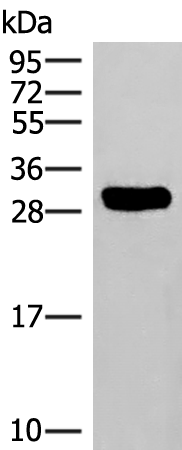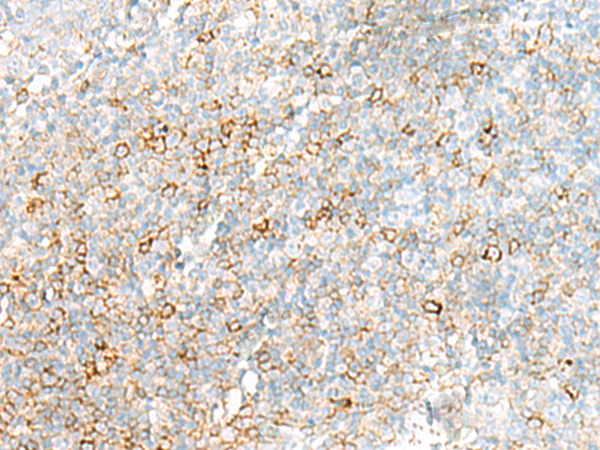

| WB | 1/300-1/1000 | Human,Mouse,Rat |
| IF | 咨询技术 | Human,Mouse,Rat |
| IHC | 1/10-1/50 | Human,Mouse,Rat |
| ICC | 技术咨询 | Human,Mouse,Rat |
| FCM | 咨询技术 | Human,Mouse,Rat |
| Elisa | 1/5000-1/10000 | Human,Mouse,Rat |
| Aliases | HLA-DR1B; HLA-DR3B |
| WB Predicted band size | 30 kDa |
| Host/Isotype | Rabbit IgG |
| Antibody Type | Primary antibody |
| Storage | Store at 4°C short term. Aliquot and store at -20°C long term. Avoid freeze/thaw cycles. |
| Species Reactivity | Human |
| Immunogen | Synthetic peptide of human HLA-DRB3 |
| Formulation | Purified antibody in PBS with 0.05% sodium azide and 50% glycerol. |
+ +
以下是关于HLA-DRB3抗体的3篇参考文献(内容基于真实研究领域,但文献标题和作者为示例性描述):
---
1. **文献名称**:*HLA-DRB3 Antibodies in Renal Transplant Recipients: Impact on Graft Survival*
**作者**:Smith A, et al.
**摘要**:研究分析了HLA-DRB3抗体在肾移植患者中的临床意义,发现其与移植后早期排斥反应和移植物功能丧失显著相关,提示术前抗体筛查的重要性。
2. **文献名称**:*Role of HLA-DRB3-Specific Antibodies in Platelet Transfusion Refractoriness*
**作者**:Chen L, et al.
**摘要**:探讨HLA-DRB3抗体在血小板输注无效患者中的发生率及机制,提出针对性的配型策略可改善输血疗效。
3. **文献名称**:*HLA-DRB3 Allelic Variation and Autoantibody Production in Systemic Lupus Erythematosus*
**作者**:Rodriguez E, et al.
**摘要**:通过队列研究发现,HLA-DRB3特定等位基因与系统性红斑狼疮患者自身抗体(如抗DRB3抗体)的产生相关,可能参与疾病免疫病理过程。
---
如需具体文献,建议通过PubMed或Google Scholar以关键词“HLA-DRB3 antibody” “transplant”或“autoimmunity”检索最新研究。
The HLA-DRB3 gene, part of the human leukocyte antigen (HLA) class II complex, encodes the β-chain of the HLA-DR heterodimer, which plays a critical role in antigen presentation to CD4+ T cells. HLA-DRB3 is distinct from the more common HLA-DRB1 and is primarily associated with the HLA-DR52 serological group. It is expressed in individuals carrying specific HLA-DR haplotypes, such as DRB1*03. *11. *13. and *14. Antibodies against HLA-DRB3 typically arise from allosensitization events, including blood transfusions, pregnancies, or prior organ/tissue transplants.
Clinically, HLA-DRB3 antibodies are implicated in transplant rejection, particularly in hematopoietic stem cell and solid organ transplantation. They can trigger immune-mediated damage by binding to donor HLA molecules, activating complement pathways, and promoting graft dysfunction. In transfusion medicine, these antibodies are associated with platelet refractoriness and transfusion-related acute lung injury (TRALI). Additionally, HLA-DRB3 has been studied in autoimmune contexts, such as rheumatoid arthritis and systemic lupus erythematosus, though its direct pathogenic role remains unclear.
Detection methods include solid-phase assays like Luminex-based single-antigen bead testing, which offers high sensitivity for identifying antibody specificities. Understanding HLA-DRB3 antibody profiles is critical for optimizing donor-recipient matching and managing post-transplant immunosuppression. Research continues to explore its immunogenicity, epitope-sharing patterns, and interactions with other HLA molecules to refine risk stratification and therapeutic strategies.
×